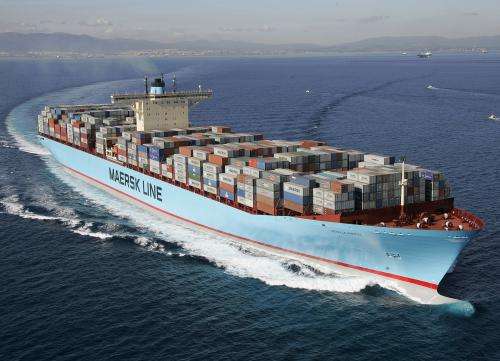Alongside the luxury liners, the oceans are also host to many container ships whose owners are similarly relying on greater efficiency with Siemens technology as a result of high fuel costs. Alone through the use of ship exhaust gases to generate power, the fuel consumption of eight ships belonging to a Danish company fell by over 10 percent. Credit: (c) Simon Burchett Photography, http://simonburchett.co.uk/
Technology and Software from Siemens are making the world's largest container ships more energy-efficient. The Korean shipbuilding company Daewoo is building 20 container ships for the Danish shipping company Maersk, each with a total carrying capacity of 18,000 standard containers. For this project Siemens is supplying the controls for a system that generates electric power from the waste heat of the ship's engine. Siemens also supplies shaft-driven generator motors that are used either to generate electric power or to assist the marine engines. These two technologies together reduce CO2 emissions by 12 percent. Since the efficiency of a ship depends on many different factors, Siemens has also developed a decision support tool to optimize energy consumption.
The aptly-named Triple-E-Class (= Energy efficiency, Environmentally improved, and Economy of scale) is being introduced to achieve optimal energy efficiency through a combination of size and state-of-the-art propulsion systems and controls. An important factor is the utilization of waste heat from both main engines. Heat exchangers extract heat from the exhaust gas, and use it to generate steam, which powers a turbine that generates electricity. The smaller auxiliary diesel engines no longer need to generate as much power, or they can be shut down entirely. If the waste heat generates more power than necessary, the shaft-driven generator motors use the excess energy to provide auxiliary power for the ship's screw, thus reducing the load on the main engines. If, however, there is insufficient electricity, the systems operate as generators and convert some of the propulsive energy from the engines into electric power. It's not necessary to start another engine. To optimize efficiency, Siemens has coupled the two systems with an intelligent controller.
Besides the propulsion system and electric power generation, the weather, the route, the ocean currents, or even time pressure due to layover bookings can affect the ship's energy consumption. The EcoMAIN Decision Support System from Siemens makes it easier to achieve optimal operating conditions. This software is based on the EcoMAIN data suite, which was also developed by Siemens. It collects all of the available data, such as that related to the engine's condition, route, trim or weather. This data is then presented in an open format. As a result, it can be used by applications from other suppliers making further optimization of the ship's operation possible.
Provided by Siemens






















